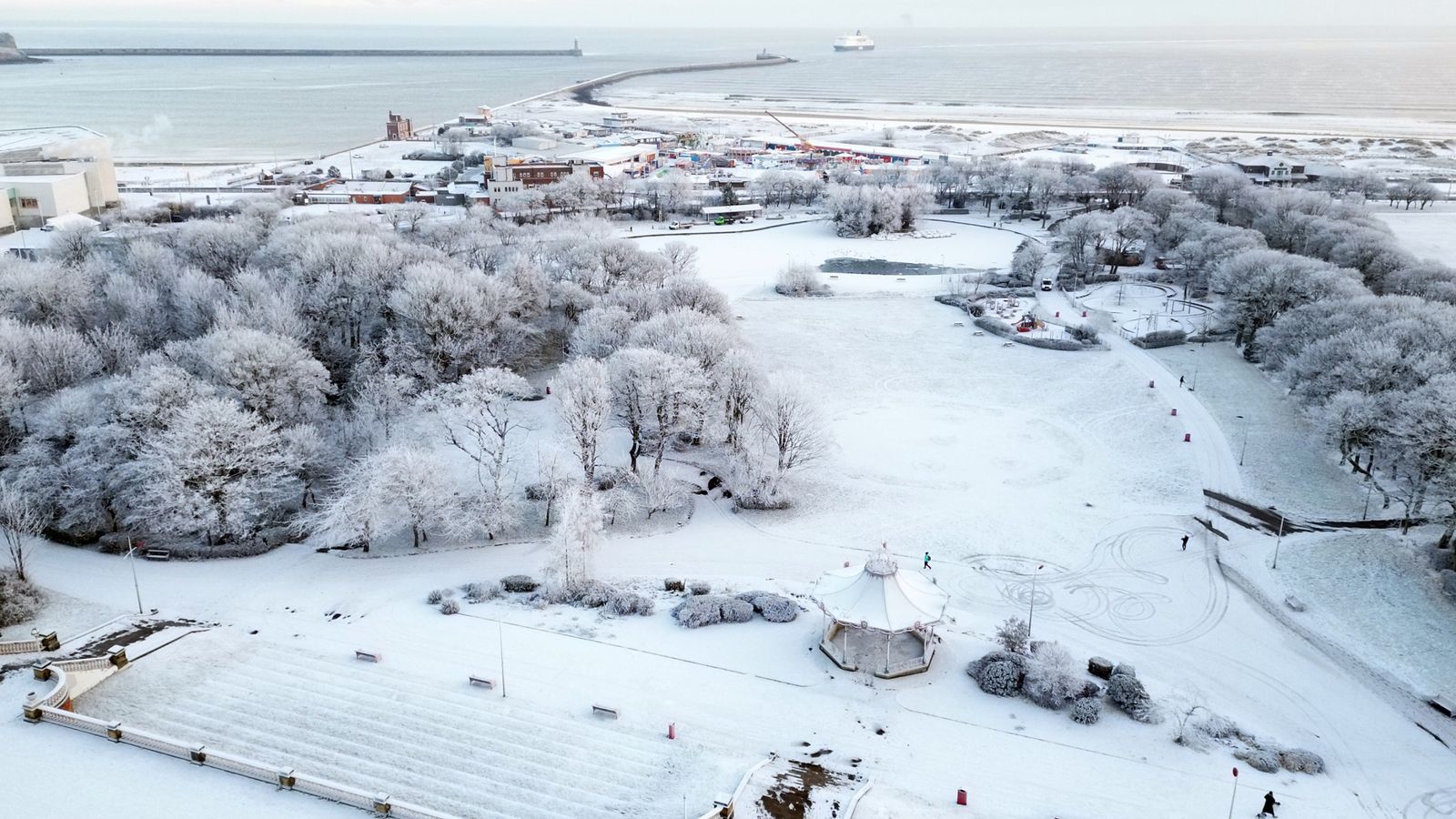More snow and ice is on the way for many parts of the UK after the record for the coldest night of the year so far was broken for the second night in a row.
The Met Office has extended a yellow warning for snow and ice covering northern Scotland and North East England until midday on Friday.
The areas covered by the warning could get up to 10cms of fresh snow on higher ground, Met Office spokesperson Becky White said.
“We could see a good few new centimetres of snow accumulation,” she said.
“We could see around 1-4cms at lower levels and 5-10cm on higher ground across the Highlands.”
Snow and ice warnings are also in place in the South West from 6pm on Tuesday until 10am Wednesday, with Ms White saying there will be a “risk of ice across the country over the next few days, but particularly tonight”.
“There is a band of rain moving in from the South West, but it may turn into snow as it reaches land,” she added.
What is the Department for Work and Pension’s Cold Weather Payment?
Snow chaos leaves airport passengers stranded with people ‘strewn across the floor’
Why is it so cold, even though climate change is making the world hotter?
Check the forecast in your area
Forecasters predict the South West could be hit with 1-2cm of snow at lower levels, and 1-10cm of snow at higher ground such as Dartmoor and Exmoor.
An ice warning has been issued for eastern England from 3pm on Tuesday until midday on Wednesday.
The Met Office has also put a yellow ice warning in place for northern parts of Northern Ireland, including Belfast and Londonderry from midday on Tuesday until midday on Wednesday.
Braemer in Aberdeenshire was the coldest place in the whole of the UK on Tuesday night, with temperatures dipping to -17.3C, breaking Monday’s record of -15.7C.
Dozens of schools were forced to close across the country for a second day due to the freezing weather as many reported heating failure, burst pipes and snow and ice.
In Shetland, power outages due to severe snowfall have been declared a major incident by the Scottish government.
Justice Secretary Keith Brown, lead minister for resilience, said that while the Scottish and Southern Electricity Networks (SSEN) is making every effort to restore supplies, “it is clear that many properties will face days without power”.
Elsewhere, the RAC experienced its biggest day for breakdowns on record, with around 12,000 drivers needing assistance.
Drivers have been urged to use main roads “as much as possible” as icy roads are “the biggest problem for drivers”.
Jack Cousens, head of roads policy for the AA, said motorists are “slipping and sliding” as sub-zero temperatures have frozen snow and uncleared ice.
He advised drivers to use main roads “as much as possible” and added: “Slow and steady is the only option when driving on frozen roads.”
Travel disruption
Travel disruption also continued on Tuesday as icy roads made conditions difficult.
The Met Office warned motorists there would be icy stretches on untreated roads, pavements, and cycle paths due to the thawing of snow left over from Monday.
After drivers were left stranded on the M25, Transport Secretary Mark Harper defended the response of the highways authorities to the cold snap.
He said that National Highways staff had been working “incredibly hard” to keep the roads moving.
And the cold snap hasn’t just affected travel on the ground. A total of 233 departures from UK airports were cancelled amid wintry conditions on Monday, according to aviation analytics firm Cirium.
Stansted was the worst affected airport, with 78 flights cancelled.
Rail strikes
Weather-related travel disruption was also followed by the first of a wave of train strikes on Tuesday.
Members of the Rail, Maritime and Transport (RMT) union are going ahead with two 48-hour strikes at Network Rail, and 14 train companies, from Tuesday and Friday.
Trains will only run from 7.30am to 6.30pm on this week’s strike days, while many parts of the country will have no services, including most of Scotland and Wales.
Read more:
Strikes every day before Christmas – which sectors are affected and why
The strike has also caused disruption across the London Underground, with the Bakerloo line part suspended between Harrow & Wealdstone to Queens Park due to the rail strike.
Meanwhile, police confirmed on Monday that three boys aged eight, 10 and 11 died after falling through ice into Babbs Mill Lake in Solihull.
A fourth boy, aged six, remains in a critical condition after the incident on Sunday afternoon.







